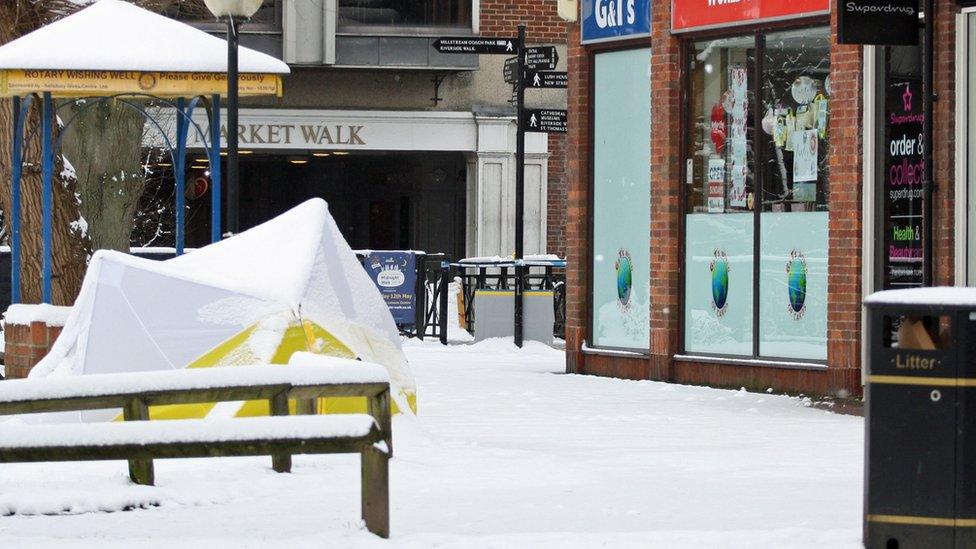Russian spy: EU offers solidarity over Salisbury poisoning case
- Published
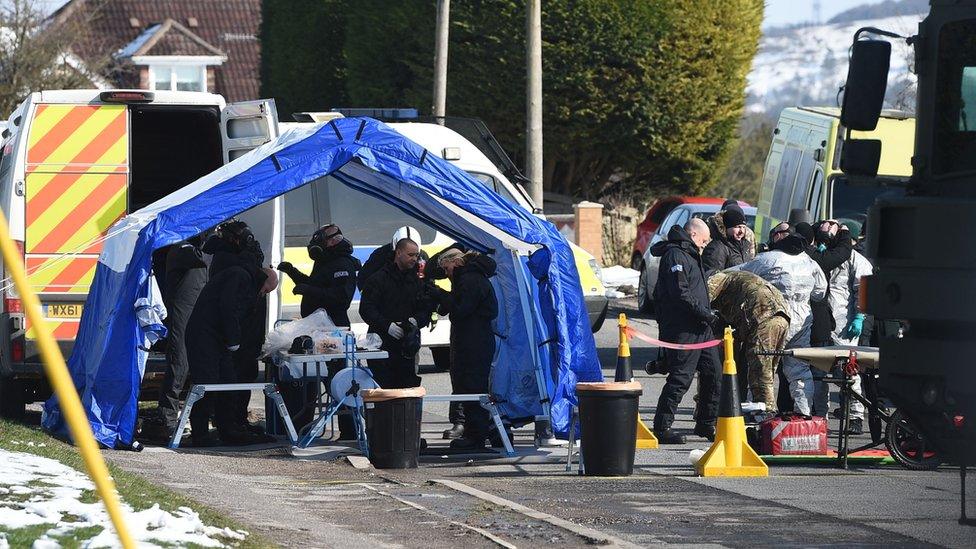
Police and military officers in protective suits in Durrington
The EU has offered the UK "unqualified solidarity" in its investigation into the poisoning of ex-Russian spy Sergei Skripal and his daughter in Salisbury.
A statement urged Russia to address the UK's questions and called for a full disclosure of its development of Novichok, the nerve agent used.
Russian President Vladimir Putin said state involvement was "unimaginable".
Meanwhile, the Army is recovering a car used to collect Yulia Skripal from the airport, the BBC understands.
It is believed the vehicle, in Durrington, Wiltshire, was used by a friend of Mr Skripal to pick up Yulia on 3 March, the day before the pair became unwell.
Both Mr Skripal, 66, and Yulia Skripal, 33, remain critically ill in hospital. They were found slumped and unconscious on a bench near a shopping centre in the centre of Salisbury on March 4, having visited a pub and a restaurant.
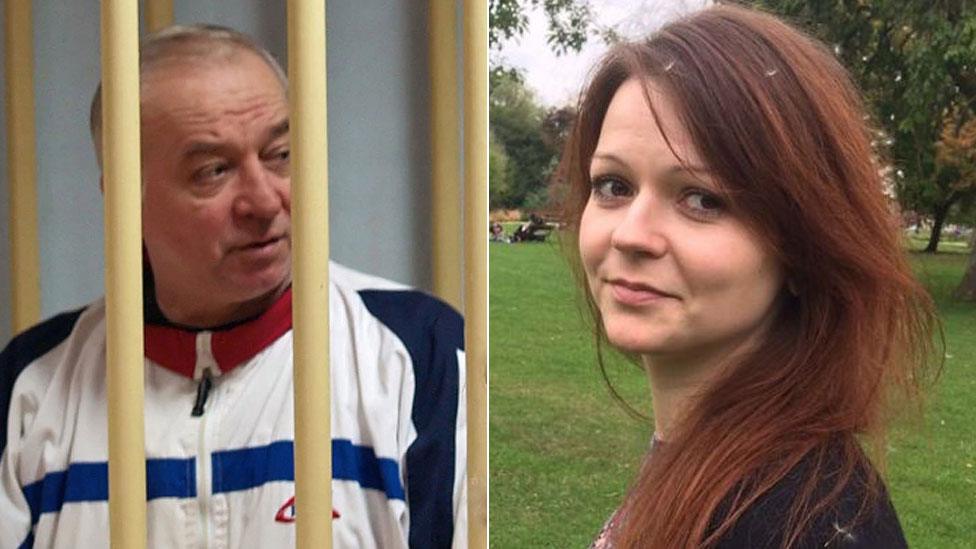
Sergei Skripal, 66, and his daughter Yulia, 33, are in a critical condition in hospital
Foreign Secretary Boris Johnson said Russian denials of involvement were "increasingly absurd" and welcomed the EU support.
Responding to President Putin's dismissal of Russian involvement, Prime Minister Theresa May said: "I'm clear that what we have seen shows that there is no other conclusion but that the Russian state is culpable for what happened on the streets of Salisbury."
The EU statement comes as international experts arrive in the UK to assess the type of nerve agent used in the attack.
Meanwhile, police investigating the murder of Russian businessman Nikolai Glushkov, who was found dead in his London home on 12 March, have found no evidence of forced entry into his house.
Mr Glushkov's death came in the same week Home Secretary Amber Rudd announced that a string of deaths on UK soil were to be reinvestigated by the police and MI5 after claims of Russian involvement.
Police have stressed there is no evidence to link Mr Glushkov's death with the attempted murder of Mr Skripal.
In a statement, the EU's foreign affairs council said it condemned the "reckless and illegal act" and said it took the UK government's view "extremely seriously" that it was likely that Russia was responsible.
"The use of chemical weapons by anyone under any circumstances is completely unacceptable and constitutes a security threat to us all," it said.
"The European Union expresses its unqualified solidarity with the UK and its support, including for the UK's efforts to bring those responsible for this crime to justice."
It urged Russia to provide "immediate, full and complete" disclosure of its Novichok programme to international body the Organisation for the Prohibition of Chemical Weapons (OPCW).
Allow X content?
This article contains content provided by X. We ask for your permission before anything is loaded, as they may be using cookies and other technologies. You may want to read X’s cookie policy, external and privacy policy, external before accepting. To view this content choose ‘accept and continue’.
Mr Johnson, who is in Brussels seeking further support for Britain's stance, said he was "very heartened" by the strength of support the UK was getting over the case.
"There is scarcely a country round the table here in Brussels that has not been affected in recent years by some kind of malign or disruptive Russian behaviour and that is why I think the strength and resolve of our European friends is so striking today," he said.
Arriving at the EU meeting in Brussels, Swedish foreign minister Margot Wallstrom told the BBC it was important that the nations were united and demonstrated solidarity with the UK
Spanish foreign minister Alfonso Dastis said it was time for an "extended examination of all the elements involved" and offered support to the UK.
But, speaking after winning a fourth term as leader, President Putin insisted Russia had destroyed all of its chemical weapons, adding it was "nonsense" to implicate his government in the attack.
The Russian ambassador to the UK, Alexander Yakovenko, said Russia destroyed all of its chemical weapons in 2017.
Allow X content?
This article contains content provided by X. We ask for your permission before anything is loaded, as they may be using cookies and other technologies. You may want to read X’s cookie policy, external and privacy policy, external before accepting. To view this content choose ‘accept and continue’.

President Putin's spokesman Dmitry Peskov told Russia's Tass news agency that the UK will have to provide evidence of its claims or apologise.
"Sooner or later they will have to be responsible for these allegations," he said.
Mr Johnson had earlier accused Moscow of stockpiling the agent used in the attack.
Ventilation system theory
A team from the Netherlands-based OPCW, which polices the prohibition of chemical weapons, was invited by the UK to the military research base at Porton Down in Wiltshire to independently verify the nerve agent used.
It will take at least two weeks to produce results.
Experts at Porton Down say the agent is of a type first developed by the Russians.
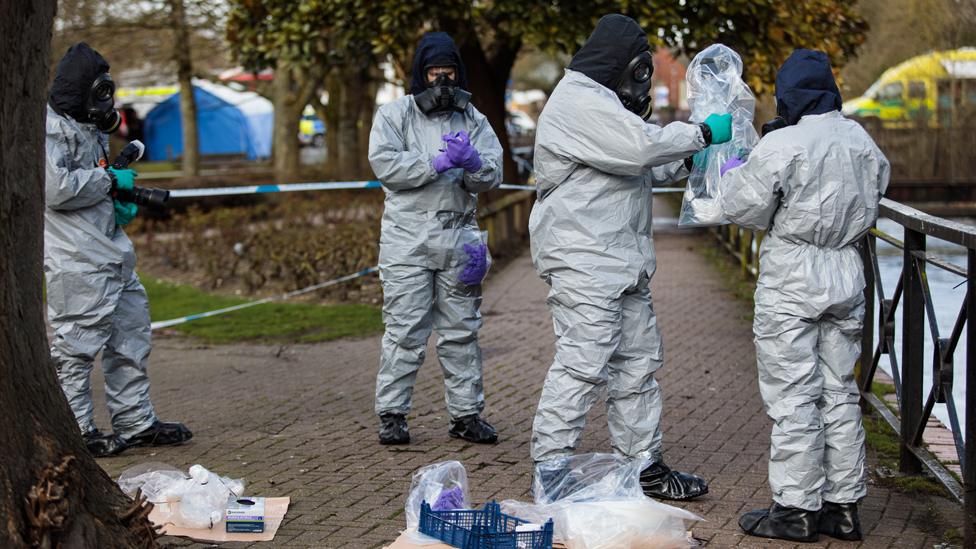
Police say their investigation will take "weeks, if not months"
The Metropolitan Police are treating the attack in Salisbury as attempted murder.
They have renewed their appeal for sightings of Mr Skripal's burgundy BMW 320D saloon car, registration HD09 WAO, on the morning of 4 March.
According to sources cited in a report on ABC News in the US, Mr Skripal and his daughter may have been exposed to the nerve agent through the vehicle's ventilation system.
Police say they have recovered 762 exhibits and are trawling through about 4,000 hours of CCTV footage.
Officers said they were "making good progress in what is a painstaking investigation that is likely to be ongoing for weeks, if not months".
Next steps
Prime Minister Theresa May told MPs last week that the substance used in the attack had been identified as belonging to a group of military-grade nerve agents known as Novichok, developed by the Soviet Union.
Speaking on the BBC's Andrew Marr Show, Boris Johnson said: "We actually have evidence within the last 10 years that Russia has not only been investigating the delivery of nerve agents for the purposes of assassination, but has also been creating and stockpiling Novichok."
Dominic Casciani shows us the locations where Sergei Skripal spent 4 March with his daughter
On Saturday, the Russian foreign ministry said UK staff would be expelled from Moscow within a week, in response to Britain's decision to expel 23 Russian diplomats.
It also said it would close the British Council in Russia, which promotes cultural ties between the nations, and the British Consulate in St Petersburg.
The prime minister has said the UK government would consider its next steps "in the coming days, alongside our allies and partners".
Meanwhile, the shadow attorney general Shami Chakrabarti reiterated Labour's position that the incident was either a "loss of control" by the Russian state or a "malevolent directed attack".
John McDonnell, the shadow chancellor, said Labour had given a "constructive critique" in response to the incident which others "had misread".
He told ITV's Peston on Sunday: "We support exactly what the prime minister said and we condemn Russia for this, condemn them."
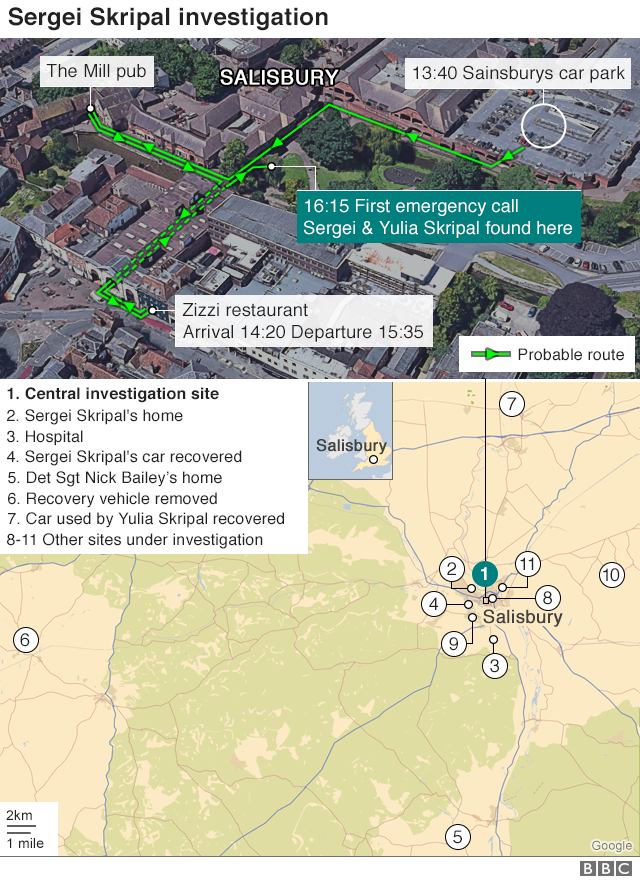
- Published8 October 2018
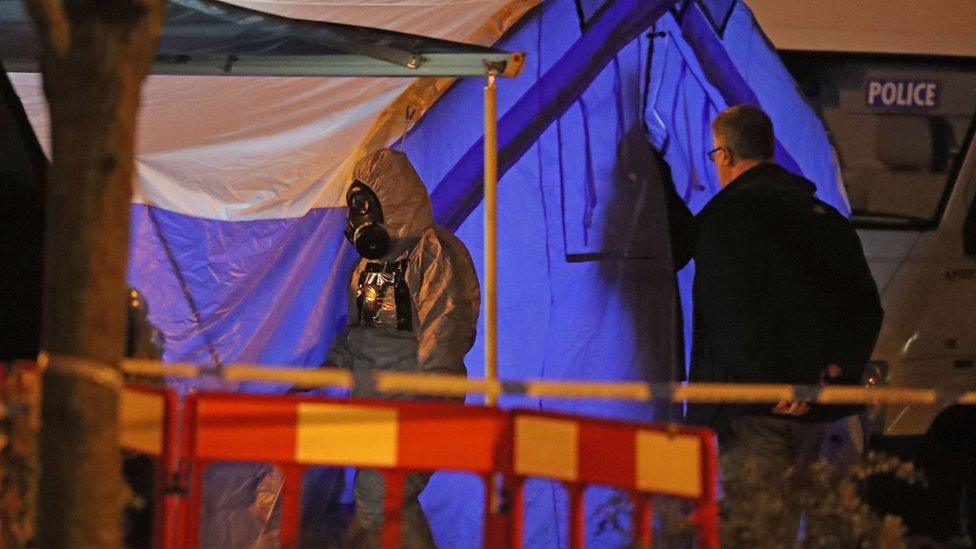
- Published17 March 2018
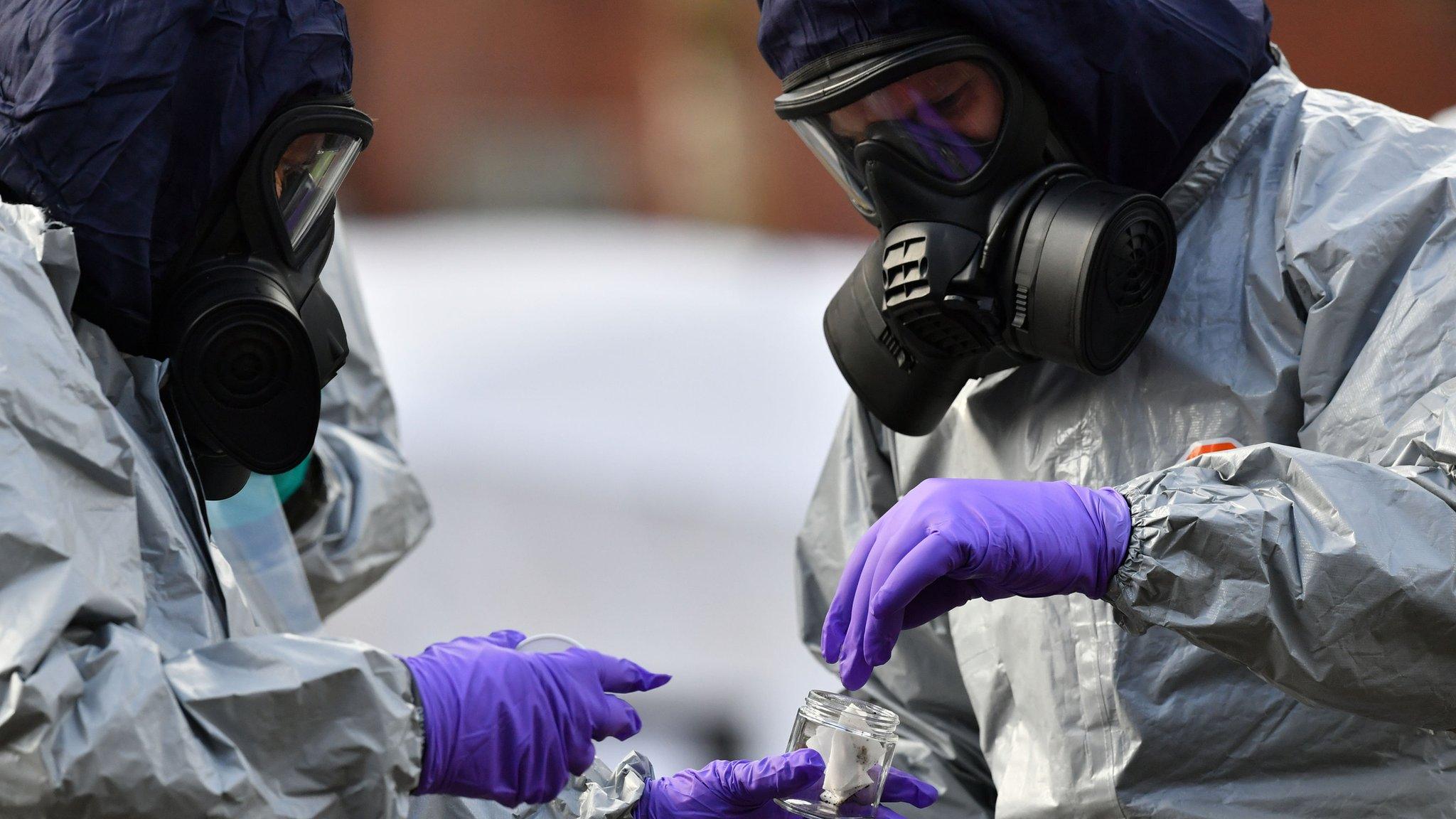
- Published2 September 2020
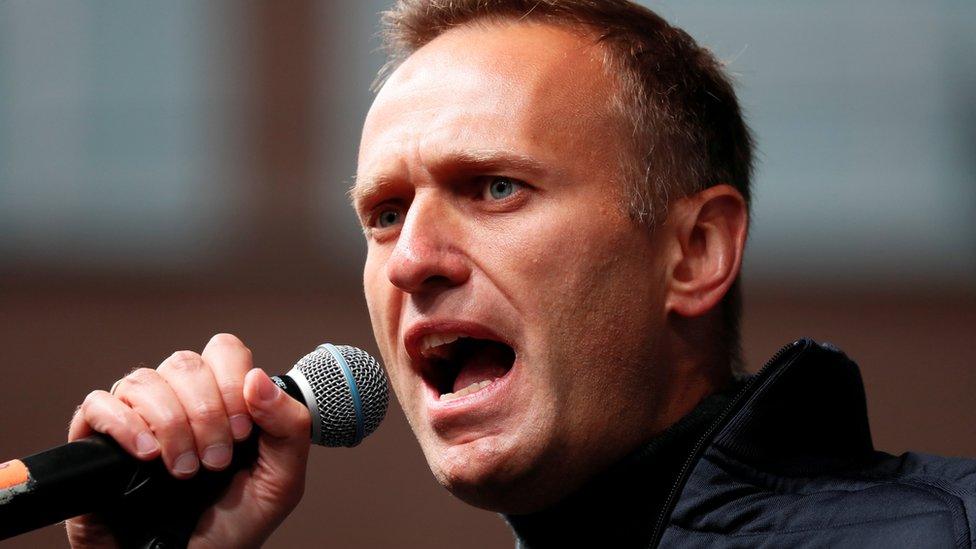
- Published18 March 2018
